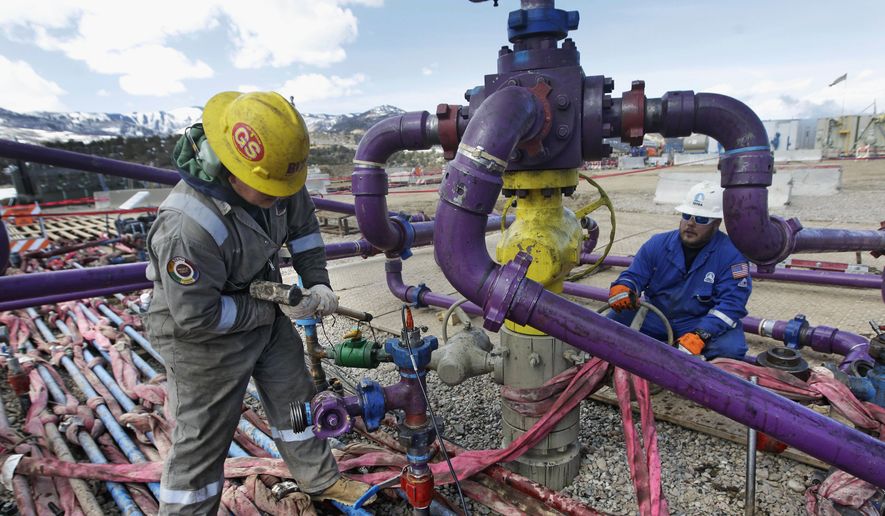A newly released cache of government emails offers more evidence of behind-the-scenes collusion between the Environmental Protection Agency and environmental groups in crafting greenhouse gas regulations, including an effort by one lobbyist to enlist the EPA in fundraising.
The Energy & Environment Legal Institute issued a report Tuesday based on 492 communications obtained last week through open records requests, one week before the U.S. Court of Appeals for the D.C. Circuit is scheduled to hear a challenge to the Obama administration’s sweeping Clean Power Plan.
The plan, a cornerstone of President Obama’s effort to combat climate change, seeks to reduce by 32 percent emissions from coal-fired plants by 2020. Critics say the goal would force most plants to close and drive up electricity costs.
The documents include EPA associate policy administrator Michael Goo’s use of a private Yahoo account for what he described as a channel for offline chats with environmental advocacy groups, including the Clean Air Task Force, as well as then-EPA Administrator Lisa Jackson’s description of the Clean Energy Group as an “industry validator” for climate change regulations.
“EPA apparently sees no distinction between its public interest function and the special interests that lobby it,” David Schnare, general counsel for the Energy & Environment Legal Institute, said in a statement. “The courts need to take a hard look at this collusive behavior and carefully examine the legal implications of EPA drafting rules in this fashion.”
The report also shows the Clean Air Task Force’s advocacy director, Conrad Schneider, brainstorming on how to use his EPA connections to boost fundraising in an email to Mr. Goo subtitled, “How you can help CATF with funders.”
“We can tell foundation program officers that we are engaged in discussions with highly-placed officials in the Obama Administration regarding viable pathways forward on 111(d),” referring to the Clean Power Plan rule, Mr. Schneider said in a November 2012 email. “I can tell foundation program officers to call you: (a) for your take on the prospects for moving a 111(d) rule; and (b) to vouch for CATF’s value-added in the 111(d) (and 111(b)) processes.”
There is no response from Mr. Goo, although Mr. Schneider describes his email as a recap of an earlier conversation.
The emails and texts cover a three-year period starting in 2011 during which Mr. Goo worked with top environmental groups to devise “options” on regulating emissions from electricity-producing power plants.
The Clean Air Task Force “is the same group to which [Mr. Goo] outsourced EPA rule-drafting responsibilities,” the Energy & Environment Legal Institute said in a Tuesday press release. “Such efforts to encourage donations for a private group crosses a new ethical line for a federal employee.”
An April 2013 exchange via text message shows Mr. Goo in contact with the Sierra Club’s John Coequyt on hydraulic fracturing, “even while EPA and the Sierra Club were in litigation against each other on the same matter,” the free market institute said in its press release.
“Goo suggested to Coequyt a strategy to get around OMB’s objections to regulating fracking, telling Coequyt that Goo would need to ’talk some sense into OMB [expletive]’ who did not share the pair’s zeal for EPA regulation of the process in a certain rule,” the institute said.
The Energy & Environment Legal Institute reiterated its call for the court to throw out the Clean Power Plan based on the agency’s failure to disclose its involvement with environmentalists in drafting the regulations.
“None of these communications was docketed in the public record when the [notice of proposed rulemaking] was released for comments, even though they resulted in a Rule carefully calibrated to shut down coal power plants,” said the report. “Commenters could not have known that the Rule was drafted through ex parte contacts with environmental groups with whom Mr. Goo once worked. Such secrecy is inconsistent with fundamental principles of due process, fair notice and accountable government.”
The EPA has declined to comment on accusations of collusion, citing ongoing litigation.
The U.S. Supreme Court issued a stay of the Clean Power Plan in February pending the outcome of a lawsuit filed by about 20 states along with industry groups.
• Valerie Richardson can be reached at vrichardson@washingtontimes.com.




Please read our comment policy before commenting.